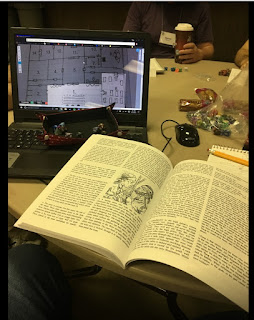It sure took long enough for the third PC death of the campaign. Craigh the Outlaw Scot looked where he shouldn't have looked and promptly disappeared like smoke up a chimney. The character's player left the character's choice up to a die roll. I don't know what contested roll against himself he settled on, but it was not the first time he had decided character action by a roll against probability. D100 of course, this is Renaissance.
The NPC body count has been gruesomely high during the game's run and at first the two earlier PC deaths seemed appropriate and fit the pace of my fiendish tastes. But man, there sure was a lag between two and three. Initial characters are robust due to a more generous damage mechanics than found in typical BRP games such as Call of Cthulhu and Elric! The chance for quick death does not punch in until characters are in negative Hit Points. Musket shot at 2D8 damage always pose the threat of serious shredding, but yes the PC's can take some punishment before Serious and Grave Wounds takes them out of the fight.
Of course in the world of Clockwork & Cthulhu horrid magic and weird creatures can exact quick (or lingering) death. And this was the situation for the scotsman Craigh. The mysterious hole had the words "Gaze Not" scrawled above it. So it was presented as threatening. It wasn't random, blam, you look in the room and then you are dead. The player had to make the choice. And I use these death puzzles sparingly. Suites the flavor of the game world; grim and deadly. I also make a point of sometimes fiddling with obscene things may work in the player's favor. I think it is a 70/30 mix. Seventy percent of the time you mess around with arcane forces you will get hosed while thirty percent of the time it will confer some advantage or vital knowledge.




